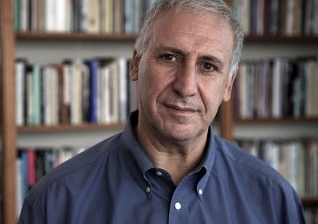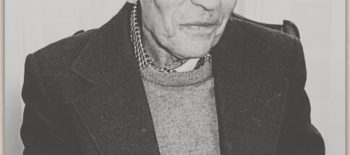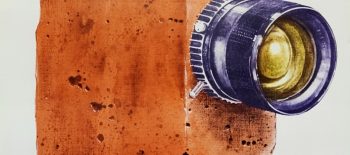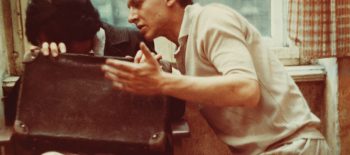Polish Poetry Unites is a new video series for anyone interested in literature, history and reading. In each episode Edward Hirsch, a distinguished American poet, and the president of the Guggenheim Memorial Foundation, will introduce a celebrated Polish poet to American audiences. Among the three poets featured in the first season of Polish Poetry Unites, the best known in the USA is probably Tadeusz Różewicz.
“Tadeusz Różewicz is a poet of dark refusals, hard negations. I would call him a naked or impure poet. He doesn’t really have time for the grand floridity,” says Edward Hirsch, poet himself and promoter of poetry, host of the video series bringing Polish poetry to American audiences.
And then he continues: “He’s an absolutely crucial figure in a generation of Polish Poets who are sometimes called New Columbuses. This is the generation of Zbigniew Herbert and Wislawa Szymborska, who are now somewhat more famous around the world.
What’s crucial about them is that they grew up in a period of time when Poland was experiencing one of its few moments of independence, but they came of age during World War Two and that stripped them of all illusions.”
Hirsh discovered Różewicz in the 1970s, when he was in his twenties.
“I’ll never forget my first experience of a poem of his, which was called “In the midst of Life,” says Hirsch, and then quotes a part of the poem, which really changed him.
“After the end of the world, after death I found myself in the midst of life,
creating myself, building life, people, animals, landscapes
This is a table, I said, this is a table. On the table is bread, a knife. A knife is to cut bread. People live off of bread.
I just can’t tell you, this just went through me, as a way to rethink poetry from the ground up.”
The poem addresses the question: is poetry possible after the Holocaust, after the horrific years of the war that took the lives and dignity of millions of people.
“To me he’s the, kind of, Samuel Beckett of Polish Poetry, because he absolutely refuses to look away, there’s something relentless, and honest, and deeply truthful in his work” says Hirsch.
In the second part of this episode, 19 year old Piotr Wołukanis from Sejny, Poland, talks about his life in the context of his favorite poem byRóżewicz, Posthumous Exoneration.
This episode features two poems by Tadeusz Różewicz
In The Middle/Midst of Life, and Posthumous Exoneration
In The Middle/Midst of Life
translated by Joanna Trzeciak
After the end of the world
after my death
I found myself in the middle of life creating myself
building a life
people animals landscapes
this is a table I kept saying
this is a table
on the table are bread knife
the knife is used for cutting bread people feed on bread
man should be loved
I learned by night by day what should one love
I answered man
this is a window I kept saying this is a window
beyond the window is a garden in the garden I see an apple tree the apple tree blossoms
the blossoms fall off fruit forms
ripens
my father picks an apple the man picking the apple is my father
I was sitting on the front steps of the house that old woman
pulling a goat on a rope
is more needed
is worth more
than the seven wonders of the world anyone who thinks or feels
she isn’t needed
is guilty of genocide
this is a man
this is a tree this is bread
people eat to live
I kept repeating to myself human life is important
human life has great importance the value of life
exceeds the value of every object man has made
man is a great treasure
I kept repeating stubbornly
this is water I kept saying stroking the waves with my hand talking to the river
water I said
kind water
it is I
the man talked to the water talked to the moon
to the flowers to the rain he talked to the earth
to the birds to the sky
the sky was silent the earth was silent if he heard a voice flowing
from the earth the water the sky it was the voice of another man
1955
Posthumous Exoneration
translated by Joanna Trzeciak
The dead
recall our indifference
the dead
recall our silence
the dead
recall our words
The dead see our smiles
stretching from ear to ear
the dead see our bodies
rubbing against each other
the dead hear our lips
smacking
The dead read our books
listen to our speeches
delivered so long ago
the dead study our essays
take part in discussions
already over
the dead see our hands
converging in applause
The dead see stadiums
choirs bands chanting
all of the living are guilty
guilty are the small children
bearing flowers
guilty are the lovers
guilty are
those who fled are guilty
and those who stayed
those who said yes
and those who said no
those who said nothing
The dead are reckoning the living
the dead will not exonerate us
Tadeusz Różewicz, (born October 9, 1921, Radomsko, Poland—died April 24, 2014, Wrocław), Polish poet and playwright, one of the leading writers of the post-World War II period.
Having seen service during World War II in the underground Polish Home Army, Różewicz used his experiences as inspiration for two of his early volumes of poems, Niepokój (1947; Faces of Anxiety) and Czerwona rękawiczka (1948; “The Red Glove”). Those works were notable for their lack of traditional poetic devices such as metre, stanza, and rhyme. Later volumes include Srebrny kłos (1955; “Silver Ear of Corn”), Twarz trzecia (1968; “The Third Face”), Na powierzchni poematu i w środku(1983; “On the Surface and Inside a Poem”), and Wyjście (2004; “Exit”).
In the 1960s Róẓewicz began writing plays, among them Kartoteka (1960; The Card Index) and Świadkowie; albo, nasza mała stabilizacja (1962; “The Witnesses; or, Our Little Stabilization”; Eng. trans. The Witnesses, and Other Plays). In a later play, Stara kobieta wysiaduje (1968; The Old Woman Broods, in The Witnesses, and Other Plays), the title character speaks her monologues from her seat on a growing pile of garbage. The Survivor, and Other Poems appeared in 1976; it was translated and introduced by Magnus J. Krynski and Robert A. Maguire. In addition to his plays and poetry, Różewicz was the author of novels, short stories, and works of nonfiction, notably Matka odchodzi (1999), which won Poland’s Nike Prize in 2000. He was the recipient of the 2007 European Prize for Literature.
Dealing with solitude, estrangement, and the existential situation of a poet, Różewicz’s poetry, in particular, gradually evolves toward values whose implications go beyond the contemporary to the universal. Ultimately, it expresses, in a simple, often metaphoric form, a concern with the moral issues inherent in the preoccupations and attitudes of modern society. In its simplicity the poetry is unlike Różewicz’s dramas, which are filled with a sense of the absurd.
Biography source: Britannica
More about Tadeusz Różewicz
Moderator: Edward Hirsch
Director: Ewa Zadrzyńska
Cinematography: Jacek Mierosławski
Editor: Anna Jędrzejewska
Executive Producer: Bartek Remisko

Edward Hirsch is an American poet and critic who wrote a national bestseller about reading poetry entitled How to Read A Poem And Fall In Love With Poetry published in 2014. He has published nine books of poems, including The Living Fire: New and Selected Poems (2010) and Gabriel: A Poem (2014), a book-length elegy for his son that The New Yorker called “a masterpiece of sorrow.” He has also published five prose books about poetry. His latest book of essays, 100 Poems to Break your Heart was published in 2021. He is president of the Guggenheim Memorial Foundation in New York City. Currently he is finishing a book of essays called The Heart of American Poetry. It will be published in April to mark the fortieth anniversary of the Library of America. The book consists of deeply personal readings of forty essential American poems. It rethinks the American tradition in poetry. Ed Hirsch lives in New York City.
Lead image: Tadeusz Różewicz, 2003, photo: Krzysztof Wojciechowski / Forum. Image source: Culture.pl



